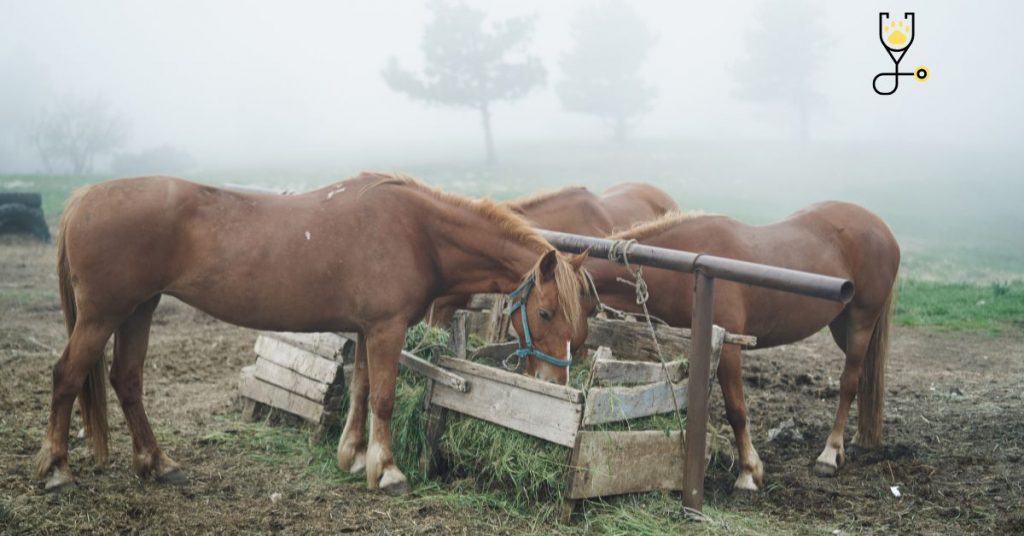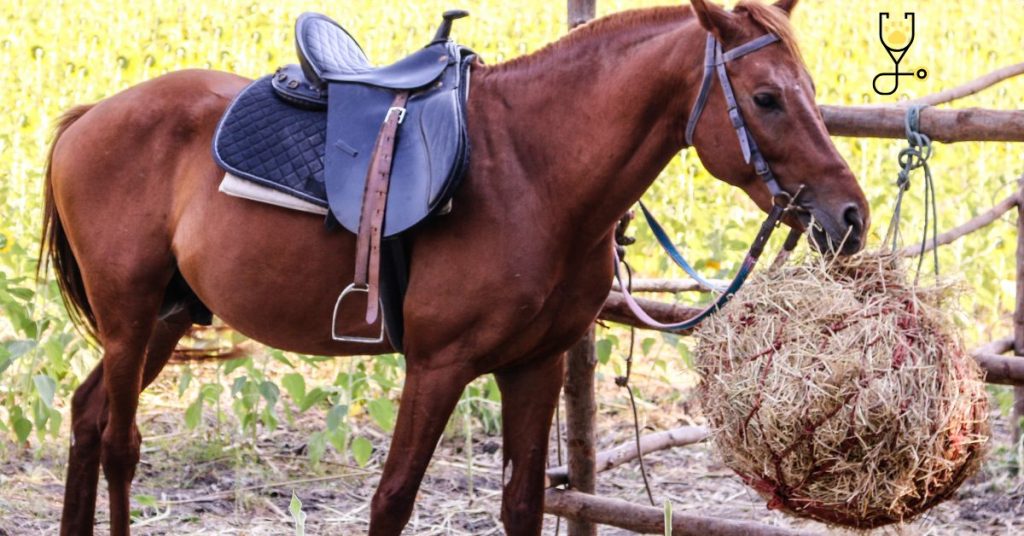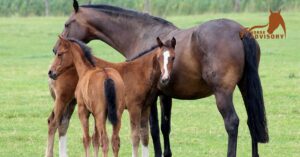Is your horse spitting out wet bundles of hay? If so, don’t worry – you’re not alone. This is a common behavior among horses and there are a few things you can do to help curb it. In this blog post, we’ll discuss the causes of quidding, as well as some tips for preventing it. So, if you’re curious about this behavior, keep reading!
What Is Quidding?
Quidding is the act of spitting out wet bundles of hay. It usually occurs when a horse is eating too fast or is anxious. When a horse chews its food, it produces saliva, which moistens the hay and makes it easier to swallow. However, if a horse is eating too quickly, the saliva doesn’t have time to do its job and the horse will spit out the wet bundle of hay.
Symptoms of Quidding
1. Spitting out wet bundles of hay
2. Drooling
3. Chewing with mouth open
4. Head shaking
Causes of Quidding
There are a few different reasons why horses may start quidding, including:

1. Anxiety: If a horse is anxious, it may start quidding as a way to release some of that tension.
2. Poor teeth: If a horse has poor teeth, it may have trouble chewing its food properly, which can lead to quidding.
3. Dusty hay: If the hay is too dusty, it can irritate a horse’s respiratory system and cause it to start quidding.
4. Moldy hay: If the hay is moldy, it can contain toxins that can make a horse sick. These toxins can cause the horse to start quidding as a way to get rid of the moldy hay.
5. New environment: If a horse is in a new environment, it may be stressed and start quidding as a way to cope with that stress.
Reasons Why Do Horses Spit Out Wet Bundles of Hay?
There are a few reasons why horses may spit out wet bundles of hay.
The most common reason is that the horse is eating too fast and the saliva doesn’t have time to moisten the hay. Other reasons include:
1. The horse is anxious or stressed.
2. The hay is of poor quality.
3. The horse is ill or has a medical condition that causes him to salivate excessively.
4. The horse has a teeth problem that prevents him from chewing properly.
5. The weather is hot and humid, which makes it difficult for the horse to swallow dry hay.
How to Prevent My Horse From Quidding?
If your horse is spitting out wet bundles of hay, there are a few things you can do to prevent it.
1. Feed your horse smaller meals more often throughout the day instead of one large meal. This will help slow down the eating process and give the saliva more time to moisten the hay.
2. Soak the hay in water for a few minutes before feeding it to your horse. This will help pre-moisten the hay and make it easier for your horse to chew and swallow.
3. Add a little bit of molasses to the hay before feeding it to your horse. The sweetness of the molasses will encourage your horse to eat slower and savor each bite.
4. If your horse is anxious or stressed, try feeding him in a quiet area away from other horses. This will help him relax and eat at a slower pace.
5. Inspect the hay before feeding it to your horse. Make sure it is of good quality and free of mold or debris.
6. If your horse is ill or has a medical condition that causes him to salivate excessively, talk to your veterinarian about treatment options.
7. If the weather is hot and humid, provide your horse with plenty of fresh water to keep him hydrated. You can also soak his hay in water before feeding it to him. By following these tips, you can help prevent your horse from spitting out wet bundles of hay.
Treatments for Quidding
If your horse is spitting out wet bundles of hay, there are a few things you can do to treat the problem.

1. Feed your horse smaller meals more often throughout the day instead of one large meal. This will help slow down the eating process and give the saliva more time to moisten the hay.
2. Soak the hay in water for a few minutes before feeding it to your horse. This will help pre-moisten the hay and make it easier for your horse to chew and swallow.
3. Add a little bit of molasses to the hay before feeding it to your horse. The sweetness of the molasses will encourage your horse to eat slower and savor each bite.
4. If your horse is anxious or stressed, try feeding him in a quiet area away from other horses. This will help him relax and eat at a slower pace.
5. Inspect the hay before feeding it to your horse. Make sure it is of good quality and free of mold or debris.
6. If your horse is ill or has a medical condition that causes him to salivate excessively, talk to your veterinarian about treatment options.
Prognosis
The prognosis for quidding is generally good. Most horses will improve with simple dietary and environmental changes. However, some horses may require medical treatment if the underlying cause is a medical condition. If you think your horse is quidding, talk to your veterinarian about the best way to treat the problem. With proper treatment, most horses will be able to return to their normal diet and activity level.
Conclusion
Quidding is a common problem in horses, but it can usually be prevented with simple dietary and environmental changes. If your horse is spitting out wet bundles of hay, try feeding him smaller meals more often or soaking the hay in water before feeding it to him. You can also add a little bit of molasses to the hay to encourage your horse to eat slower and savor each bite. If the weather is hot and humid, make sure your horse has plenty of fresh water to stay hydrated. By following these tips, you can help prevent your horse from quidding.
Frequently Asked Questions
1. What is quidding?
Quidding is the process of spitting out wet bundles of hay. It is a common problem in horses, but it can usually be prevented with simple dietary and environmental changes.
2. What are the causes of quidding?
The most common cause of quidding is eating too fast. Other possible causes include stress, anxiety, medical conditions, and the weather.
3. What is the prognosis for quidding?
The prognosis for quidding is generally good. Most horses will improve with simple dietary and environmental changes. However, some horses may require medical treatment if the underlying cause is a medical condition.
4. How can I prevent my horse from quidding?
There are a few things you can do to prevent your horse from quidding:- Feed your horse smaller meals more often throughout the day instead of one large meal.- Soak the hay in water for a few minutes before feeding it to your horse.- Add a little bit of molasses to the hay before feeding it to your horse.- If the weather is hot and humid, provide your horse with plenty of fresh water to stay hydrated.
5. My horse is quidding. What should I do?
If your horse is quidding, there are a few things you can do to treat the problem:- Feed your horse smaller meals more often throughout the day instead of one large meal.- Soak the hay in water for a few minutes before feeding it to your horse.- Add a little bit of molasses to the hay before feeding it to your horse.- If your horse is anxious or stressed, try feeding him in a quiet area away from other horses.
6. Is quidding dangerous for my horse?
Quidding is not usually dangerous for horses, but it can be a sign of an underlying medical condition. If you think your horse is quidding, talk to your veterinarian about the best way to treat the problem. With proper treatment, most horses will be able to return to their normal diet and activity level.





